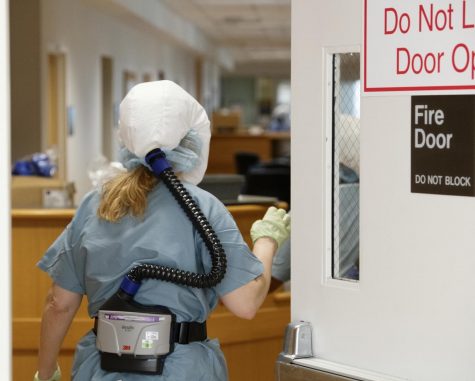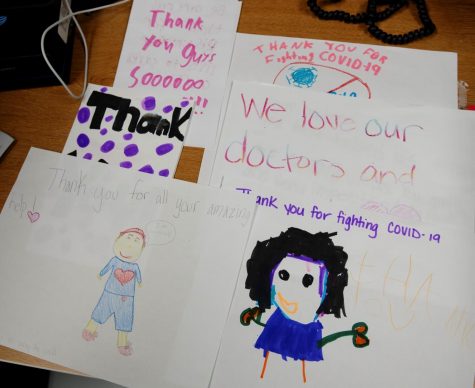NorthShore University HealthSystem responds to COVID-19 pandemic

Photo courtesy of Jon Hillenbrand, NorthShore University HealthSystem
With four hospitals in the North Shore area, NorthShore University HealthSystem plays a role in providing medical care to the Northbrook community. Now, as numbers of COVID-19 cases in the North Shore area rapidly increase, the healthcare system is adapting to the situation.
According to Susan Bednar, an Emergency Department nurse practitioner and manager of Advanced Practice Providers at NorthShore University HealthSystem, situations like the COVID-19 pandemic are what healthcare workers entered their professions for.
“This is what we signed up for and this is what we’re called to do,” Bednar said in a phone interview.
It was decided early on that the best thing to do was extend Evanston Hospital’s emergency department, also known as ED, ambulance bay to accommodate more COVID-19 patient testing. The ambulance bay is the covered area outside the hospital where ambulances would normally drop off patients to the ED, Bednar said.
Negative airflow, an important isolation measure used when dealing with diseases spread via airborne transmission and respiratory droplets, was implemented into the extended ambulance bay. A negative airflow environment eliminates the recirculation of potentially contaminated air between patient rooms, Bednar said.
“Patients don’t really enter the ED,” said Bednar. “They [go] through [a separate] entrance, they are seen and treated, and oftentimes discharged from that bay never having to go into the ED, … so [testing in the bay] protects them from being exposed to [COVID-positive] patients.”
According to Dr. Nirav S. Shah, an Infectious Disease physician at NorthShore University HealthSystem, part of NorthShore’s COVID-19 response included becoming part of both large multi-center clinical trials as well as NorthShore investigator-initiated research studies. These studies test investigational drugs and treatment protocols to provide COVID-19 patients with approved experimental therapies.
“We’re opening up quite a few other studies including a study called convalescent sera,” said Shah in a phone interview. “… if someone comes down with COVID-19 and they get better, they develop antibodies towards this virus and so if we take the plasma of these patients who have recovered, we can potentially use that to treat [acutely ill hospitalized] patients.”
All experimental therapies are to be provided as in-patient treatments. In addition, NorthShore is also working on a study around the autoimmune disease drug hydroxychloroquine, originally approved to prevent malaria. This study would test hydroxychloroquine therapy for people exposed to the virus to prevent them from requiring hospitalization, Shah said.
According to Dr. Shashi Bellam, pulmonologist and critical care physician at NorthShore University HealthSystem, because there are no proven treatments as of this moment, patients are provided supportive care, often allowing enough time for recovery.
Whether a patient is admitted to a hospital depends on many factors beyond a need for supplemental oxygen therapy. Some of these factors include vital signs such as heart rate, blood pressure, and respiratory rate and other medical conditions and whether they have a sufficient support system to be taken care of at home, Bellam said in a phone interview.
“[COVID-19] is not different [from] any other disease which we take care of, where we have to look at a whole variety of different parameters and figure out how to take care of the patient,” Bellam said.
According to Bednar, all healthcare workers have been very intentional when explaining what they are doing and keeping patients up to date about their care.
“We are acutely aware that information is power and in the absence of information it will just worsen the fear,” Bednar said.
According to Bellam, healthcare workers take precautions by wearing personal protective equipment because of the high rate of disease transmission.
“I really focus on helping the patients and families feel supported … despite the caregivers wearing personal protective equipment, despite [that patients] aren’t having visitors in the room, that they feel that we’re there for them, that they are definitely not alone and that their family knows what’s going on,” said Bellam.
According to Shah, non-COVID-19 patients have also been impacted as most of their doctor-patient encounters have become remote through teleconferencing.
According to Bednar, the administration at NorthShore was proactive in creating a labor pool where employees who are not actively working, as their department or office was temporarily closed, are coming in to help with in-patient COVID-19 care.
“For example, we have some surgical [Physician Assistants] that normally would work in the department of surgery either at Skokie or Highland Park [Hospitals],” said Bednar. “They’re helping us out in the ED’s, certainly at Evanston with the ambulance bay buildout.”
According to Shah, while most COVID-19 patients are taken care of at Glenbrook Hospital, some of them are treated at Evanston Hospital. Glenbrook Hospital was chosen to be the COVID-designated facility because of its large number of negative airflow environments. While the Glenbrook ED is still open to non-COVID-19 patients, they are redirected to a different NorthShore hospital if hospitalization is required.
According to Bellam, the community has been very appreciative of healthcare workers throughout the COVID-19 pandemic.
“As a doctor … when you go out and see the appreciation from all of our community for all the healthcare workers, it’s just great to see and it really does make a difference,” Bellam said.
According to Bednar, healthcare workers are rising up to the challenge COVID-19 poses, knowing they are trained for situations like this.
“We look at each other and think … new problems come up each day and between all of us we figure out the solutions, we think on our feet,” Bednar said.

Photo courtesy of Jon Hillenbrand, NorthShore University HealthSystem

